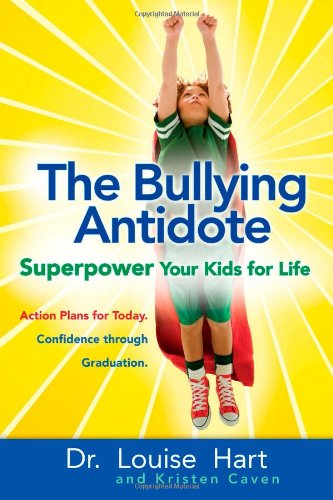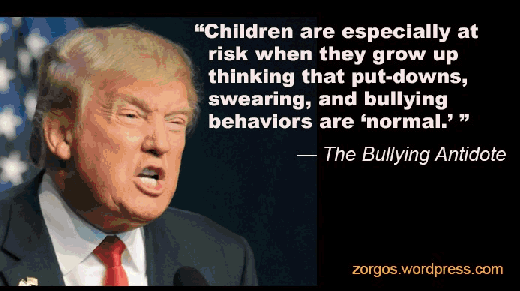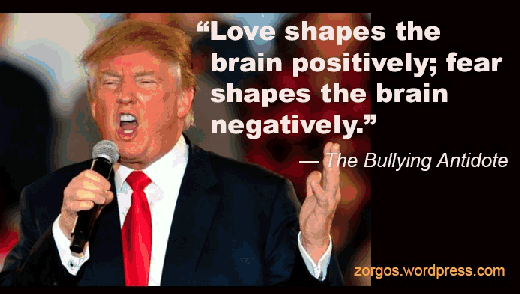An All American Bully
How is the presidential election affecting children? The Trump Effect: The Impact of The 2016 Presidential Election on Our Nation’s Schools surveyed over 10,000 teachers, counselors, administrators and others who work in schools. The survey data indicate that the results of the election are having a profoundly negative impact on schools and students. Ninety percent of educators report that school climate has been negatively affected, and most of them believe it will have a long-lasting impact. A full 80 percent describe heightened anxiety and concern on the part of students worried about the impact of the election on themselves and their families. Also on the upswing: verbal harassment, the use of slurs and derogatory language, and disturbing incidents involving swastikas, Nazi salutes and Confederate flags. In her article below and more to come on Kindred, Kristen Caven, co-author of The Bullying Antidote: Superpower Your Kid For Life and co-founder of The Zorgas Project shares her insights and resources for preparing yourself and your child for the cultural swing toward normalizing bullying through our new Bully-In-Chief’s ongoing example.
Read more on how we got here, the neuroscience insights into the Trump phenomenon and what’s really happening by Kindred contributors here.
An All American Bully
America’s powerful attraction to the irreverent charm of Donald Trump is absolutely baffling to educated Americans and to the rest of the world. No matter how many stories of his racist speech, his sexist attitudes, his unethical business practices, or his rudeness to just about everybody came to light during the race, no matter how many platform questions he dodged, no matter how many people of all stripes he proudly harassed, he somehow came out the winner. But politics are often where we see bullying and most clearly… and where we also see Zorgos, it’s antidote.
ZORGOS is the superpower that defeats bullying. The overall intent is not just to stop a single bullying incident, but to develop immunity in today’s children to future bullying events. The Bullying Antidote shows how parents and community leaders, by becoming educated about the mechanics of power dynamics and prevention, can build bully-free, emotionally safe families, neighborhoods, and communities.
Here is a concept you can share with others to create conversation.
The reason Trump may be so beloved by his supporters is that so many Americans relate to the bullying dynamic. A bully’s true power comes from his or her followers, who perceive dominance as strength and who feel, themselves, like victims of the target. Allying with a bully makes an insecure person feel stronger. They project their fears onto the target and feel as if the bully is the hero.
Americans have certainly been victims of bad politics. They have also been the beneficiaries of good politics. But the narrative of the Conservative Media and the tactics of the Republican Party have been, for years, to complain about all politics, diverting attention away from real problems and keeping it focused on distressing images of potential dangers. Americans, like innocent bystanders, don’t realize they have been played until after someone gets hurt.
Today, I am reeling, like so many others, at the beating our democracy, and our decency, has taken. The Democrats put forth the most experienced, hardworking, growth-oriented changemaker available, and she was defeated by fear-fueled hatred and misogyny. The candidate who won on the facts was smeared by suspicion and rumor by someone who actually has behaved criminally. And what we face, going forward, is a nation divided by lies.
After a bullying episode, the only tool currently at our disposal that does not continue the cycle of retribution is the practice of Restorative Justice. This takes place in communities, where victims share their pain and bullies hear it. Where empathy is built, common goals are identified, and solutions are created by all. In these conversations, the bully is not seen as the leader. His power is neutralized by the greater voice of the community.
And so it is with politics. As much as they may sound like it, presidents are not dictators. In a bullying situation, a target recovers by disengaging and re-grouping. You are not the boss of me. You do not get to decide who I am. This experience does not define me. I make my own choices, and I choose to be better than this.
What Is Zorgos?
Please share this public service announcement from recording artist David Bryce:
Do you suffer from bullying?
I don’t just mean that schoolyard jerk who keeps punching you in the head when the teacher’s not looking, or the bad boss who makes everything look like it’s your fault or the boyfriend who calls you fat behind closed doors or in front of your friends—though I do mean them too—but I mean all the ways kids AND adults being mean or insensitive or just dominating others for some reason or another create this ripple effect in your community that brings the energy down and sucks up all the oxygen and wastes your precious time? You know, time you’d rather spend getting your own work done? Having fun with your peeps? Making the world a better place?
Well, you should be making the world a better place. And so should those jerks who are making you and other people feel like, well, (farting noise.)
If you suffer from bullying, suffer no longer. There is a solution!
There are many solutions, as a matter of fact! And I bet you know what some of them are already! Positive thoughts and speech, clear limits, high expectations, positive role models, warm family climates, self-esteem, impulse control, connection, trust, friendship, social skills, empathy, assertiveness, respect, good boundaries, compassion, fairness, prevention, resilience, kindness, mercy, non-violent communication, AND a sense of humor.
But that’s too much to say in one breath. (For you, but not for me.) So when you are looking for the word for that thing that transforms helplessness into hopefulness, just say:
Zorgos. (whisper) Zorgos. (shout) Zorgos!
It feels great, doesn’t it?
When you’ve got zorgos (and you KNOW people who have it—think Oprah, Malala, Springsteen, Mandela, Peter Parker—) you want to shift out of negative power dynamics and into positive connection. You want to find the thing that will help everyone get what they need so people stop climbing on everyone else’s power. You want to find friends who have zorgos, and you want to build zorgos into your family, your friendships, your school, your neighborhood, your workplace. You want to stop the (farting noise) and start the (cheering noise).
Zorgos comes from the esperanto word for “I will take care.” Esperanto is a worldwide language. If you want to learn more about how to build Zorgos and all it stands for into your life then grab a friend and read The Bullying Antidote together.
Visit the Zorgos Project at www.zorgosproject.com to get started.
50 Things You Will Learn In The Bullying Antidote
 1. Ten cultural crises related to bullying
1. Ten cultural crises related to bullying
2. Parenting styles that can either nurture or interrupt bullying behaviors
3. How bullying is perpetuated in the family
4. Common phrases that make rudeness okay
5. Three ways parents with good intentions unknowingly raise bullies
6. How to interrupt negative family patterns
7. How bullies, victims, and targets are part of a preventable knee-jerk dynamic
8. What bullying is and what it is not
9. How movies and video games teach and perpetuate violent behavior
10. How to turn around a culture of violence
11. Ten ways well-meaning parents bully their kids
12. What to do when your child is bullied, bullies, or witnesses bullying
13. Why our brains cling to negativity
14. How to shift from negative to positive thoughts and emotions
15. What mental health actually looks like
16. Qualities of parents and teachers who prevent bullying
17. How to build a child’s core strengths and competencies
18. The three tiers of prevention, and what they look like in schools and communities
19. How to evaluate a school culture
20. How to parent using positive psychology
21. The three most critical jobs of positive parents
22. How to stop having conflict with children
23. How to build stronger family connections
24. How to help each person in a family be in control
25. Traps to self-understanding for parents and kids alike
26. Ten tools for healing personal pain
27. Why connection is the “super-protective factor”
28. How to increase emotional intelligence and encourage self-regulation
29. Why pro-social education is anti-bullying education
30. How assertive communication is non-violent communication
31. Seven blocks to good listening
32. How to do damage control in family communication
33. How to give feedback without criticizing
34. Twelve steps to peacemaking
35. How nurture and structure balance family life and emotions
36. How functional parent relationships can stabilize children
37. Why asking for what you want is so difficult
38. How to restructure family power
39. How to build your authority without being a dictator
40. How to cultivate a child’s brain positively
41. Eight steps for managing emotional meltdowns
42. Ten ways to build resilience
43. How the Army now builds resilience
44. Steps to moving beyond bullying
45. Ten ways technology makes kids more vulnerable
46. The neuroscience of internet addiction
47. How to use technology positively at all ages
48. Framing bullying as a human rights issue
49. How other nations have fought bullying successfully, and
50. How to build ZORGOS into our families and society.
Don’t read The Bullying Antidote alone! Bullying is a cultural dynamic and real change happens more powerfully when we grow together. Read and discuss The Bullying Antidote with other parents from your school, your church, your family, or your community.
Get the Discussion Guide here.
Featured image Shutterstock/hotgor61





